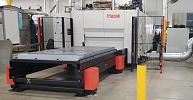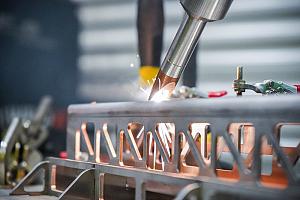- FMA
- The Fabricator
- FABTECH
- Canadian Metalworking
Categories
- Additive Manufacturing
- Aluminum Welding
- Arc Welding
- Assembly and Joining
- Automation and Robotics
- Bending and Forming
- Consumables
- Cutting and Weld Prep
- Electric Vehicles
- En Español
- Finishing
- Hydroforming
- Laser Cutting
- Laser Welding
- Machining
- Manufacturing Software
- Materials Handling
- Metals/Materials
- Oxyfuel Cutting
- Plasma Cutting
- Power Tools
- Punching and Other Holemaking
- Roll Forming
- Safety
- Sawing
- Shearing
- Shop Management
- Testing and Measuring
- Tube and Pipe Fabrication
- Tube and Pipe Production
- Waterjet Cutting
Industry Directory
Webcasts
Podcasts
FAB 40
Advertise
Subscribe
Account Login
Search
Fictiv report shows manufacturers investing in digital transformation
- April 28, 2021
- News Release
- Shop Management
Global manufacturing and supply chains were severely disrupted by the COVID-19 global pandemic, forcing companies to adapt and plan for a new business reality. The newly released “2021 State of Manufacturing Report” from San Francisco-based Fictiv reveals an industry that is already quickly rebounding with investments in digital transformation aimed at improving speed, resilience, and sustainability. While areas of concern persist, most report that lessons from the pandemic have paved the way for new innovations.
According to the report, industry leaders believe now is the time to accelerate the pace of change, with 95% saying the pandemic has had long-term effects on their business and that same number (95%) agreeing that digital transformation is essential to their company’s future success. The pandemic laid bare deep weaknesses in supply chains, as 94% of survey respondents reported concerns about their current supply chains and 92% said their supply chains act as barriers to product innovation.
As companies move into a postpandemic era, they are looking to futureproof their manufacturing, with 62% pursuing a reshoring strategy, 89% reporting that sustainable manufacturing is a growing priority, and 84% having turned to on-demand manufacturing as a solution.
“The overriding takeaway from this year’s report is that the pandemic served as a catalyst to turn emerging digital ideas into strategies that are now irrevocably changing supply chains,” said Fictiv CEO Dave Evans. “Companies moved quickly and decisively to solve short-term problems but recognized that the limitations of their current supply chains required long-term investment and innovation. Looking ahead, industry leaders are nearly unanimous in their expectations that those digital investments will help them build faster, greener, and more resilient supply chains.”
Conducted with Dimensional Research, the sixth annual manufacturing industry report polled hundreds of senior manufacturing and supply chain decision-makers at companies producing medical device, robotics, automotive, aerospace, and consumer electronics products. Among those industries with plans to onshore in 2021, 80% of medical device companies reported it is a key strategy, followed by 67% in robotics, 61% in automotive, and 45% in consumer electronics. Fifty-five percent reported that workforce training is the No. 1 barrier to increasing their U.S.-based manufacturing footprint, followed by cost (43%), insufficient capacity (36%), and lack of access to needed technologies compared to global suppliers (31%). Only 10% of survey respondents reported they see no barriers to manufacturing in the U.S.
Respondents said that slow feedback loops with manufacturing partners, as well as difficulty sourcing fast, high-quality options to manufacture low-volume builds, are among the top barriers to new product introduction, while 45% reported that rigid internal processes hamper their team’s ability to innovate. Moreover, 97% of companies reported that supply chain management consumes a significant amount of employees’ time, and 81% said that quality issues in their supply chain have resulted in cost overruns in the past year. Fifty-five percent said that their existing supply chain presents IT security risks, and 42% reported concerns about IP protection risks.
Limited budgets are a key barrier to hiring new talent for 45% of respondents, while 44% reported difficulty hiring manufacturing talent with the necessary digital expertise.
subscribe now

The Fabricator is North America's leading magazine for the metal forming and fabricating industry. The magazine delivers the news, technical articles, and case histories that enable fabricators to do their jobs more efficiently. The Fabricator has served the industry since 1970.
start your free subscription- Stay connected from anywhere

Easily access valuable industry resources now with full access to the digital edition of The Fabricator.

Easily access valuable industry resources now with full access to the digital edition of The Welder.

Easily access valuable industry resources now with full access to the digital edition of The Tube and Pipe Journal.
- Podcasting
- Podcast:
- The Fabricator Podcast
- Published:
- 04/30/2024
- Running Time:
- 53:00
Seth Feldman of Iowa-based Wertzbaugher Services joins The Fabricator Podcast to offer his take as a Gen Zer...
- Trending Articles
JM Steel triples capacity for solar energy projects at Pennsylvania facility

Fabricating favorite childhood memories

How laser and TIG welding coexist in the modern job shop

Robotic welding sets up small-batch manufacturer for future growth

Ultra Tool and Manufacturing adds 2D laser system

- Industry Events
Pipe and Tube Conference
- May 21 - 22, 2024
- Omaha, NE
World-Class Roll Forming Workshop
- June 5 - 6, 2024
- Louisville, KY
Advanced Laser Application Workshop
- June 25 - 27, 2024
- Novi, MI
Precision Press Brake Certificate Course
- July 31 - August 1, 2024
- Elgin,

























